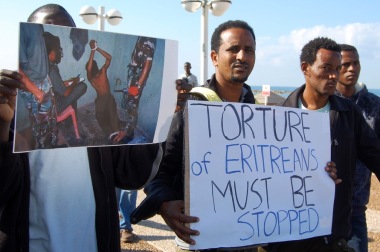Eritrea comes to Brussels
2016-11-30 00:07:49 Written by Martin Plau Published in English Articles Read 2387 times|
|
The Irish MEP, Brian Hayes, hosted a meeting in the European Parliament on Monday for an Eritrean delegation led by the country’s Information Minister Yemane Gebremeskel.
Their presence came despite protests from European and Eritrean human rights campaigners, who called for the meeting to be cancelled.
Mr Hayes, Fine Gael representative for Dublin, visited Eritrea in May, producing a distinctly upbeat report about the situation in the country.
“Over the past five years Ireland has committed over a million euro to projects in Eritrea. Over 20,000 Eritrean families have been directly helped.”
“It is great to get the opportunity to visit Eritrea and see first-hand these programmes in action. I believe that enabling sustainable livelihoods is a critical factor in determining Eritrea’s future,” he said.
Ahead of Monday’s meeting in Brussels he wrote: “I believe by bringing everyone together for this conference, positive outcomes can be achieved.”
The meeting was attended by a UNDP representative and the Irish aid agency VITA that has been working inside Eritrea for some time.
The tone of the gath https://martinplaut.files.wordpress.com/2016/11/torture-eritrea.jpg?w=760&h=504 760w, https://martinplaut.files.wordpress.com/2016/11/torture-eritrea.jpg?w=150&h=99 150w, https://martinplaut.files.wordpress.com/2016/11/torture-eritrea.jpg?w=300&h=199 300w" sizes="(max-) 100vw, 380px">ering was perhaps best summed up in a tweet which Mr Hayes shared: “Engagement is the key”.
https://martinplaut.files.wordpress.com/2016/11/torture-eritrea.jpg?w=760&h=504 760w, https://martinplaut.files.wordpress.com/2016/11/torture-eritrea.jpg?w=150&h=99 150w, https://martinplaut.files.wordpress.com/2016/11/torture-eritrea.jpg?w=300&h=199 300w" sizes="(max-) 100vw, 380px">ering was perhaps best summed up in a tweet which Mr Hayes shared: “Engagement is the key”.
Eritrea’s notorious human rights record was glossed over, dismissing the findings of a United Nations Commission of Inquiry that the government was responsible for crimes against humanity.
As the UN put it: "Crimes of enslavement, imprisonment, enforced disappearances, torture, persecution, rape, murder and other inhumane acts – have been committed as part of a widespread and systematic campaign since 1991 aimed at maintaining control over the population and perpetuating the Eritrean leadership’s rule."
The exodus of young Eritreans fleeing the country was put down to a lack of appropriate employment.
Yemane Gebremeskel, speaking for the government described the opportunities for investment there existed for agricultural development and other areas, such as natural resources.
But the views of the panel did not go unchallenged.
Zara - an Eritrean human rights activist from the Stop Slavery in Eritrea Campaign - demanded to know why no mention had been made of the thousands of political prisoners, despite repeated attempts by Mr Hayes to cut her contribution off.
And Daniel, a recently arrived refugee, told the meeting that nothing had changed in Eritrea since he was forced into exile, and called for the situation not to be ignored.
Martin Plaut | 28/11/2016 at 8:54 pm | Tags: Eritrea, European Parliament, European Union, Torture, UN Commission of Inquiry | Categories: Africa, Eritrea, European Union, Uncategorized | URL: http://wp.me/p1OD48-2eM




















